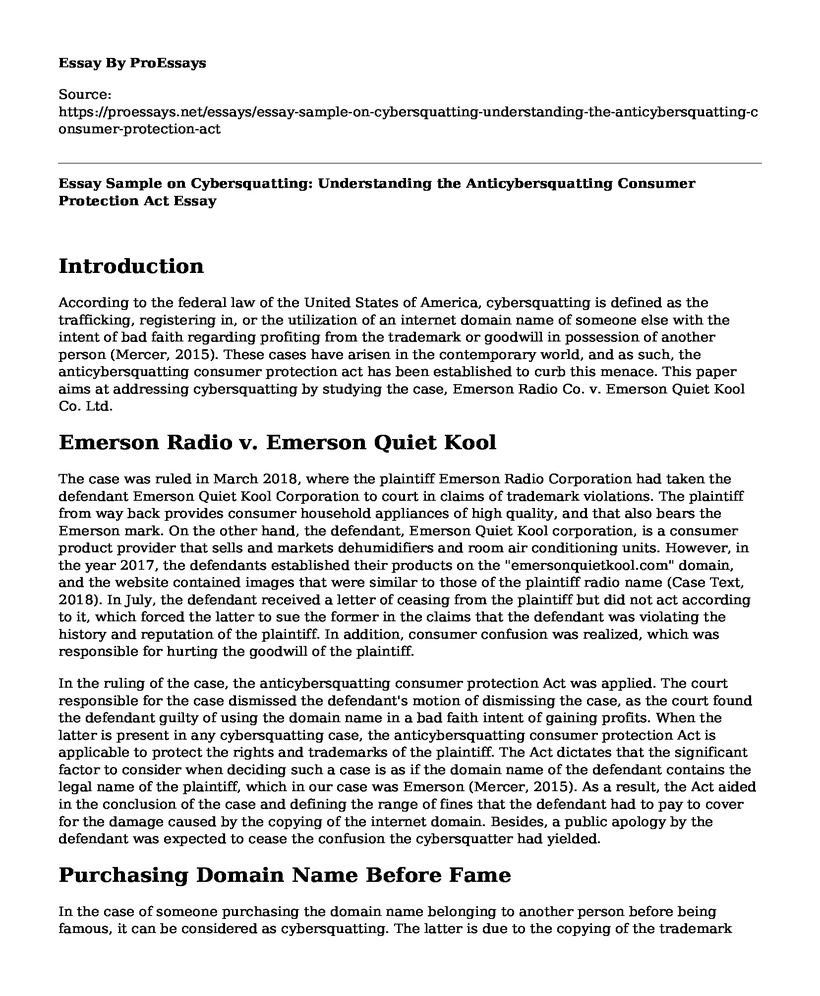Introduction
According to the federal law of the United States of America, cybersquatting is defined as the trafficking, registering in, or the utilization of an internet domain name of someone else with the intent of bad faith regarding profiting from the trademark or goodwill in possession of another person (Mercer, 2015). These cases have arisen in the contemporary world, and as such, the anticybersquatting consumer protection act has been established to curb this menace. This paper aims at addressing cybersquatting by studying the case, Emerson Radio Co. v. Emerson Quiet Kool Co. Ltd.
Emerson Radio v. Emerson Quiet Kool
The case was ruled in March 2018, where the plaintiff Emerson Radio Corporation had taken the defendant Emerson Quiet Kool Corporation to court in claims of trademark violations. The plaintiff from way back provides consumer household appliances of high quality, and that also bears the Emerson mark. On the other hand, the defendant, Emerson Quiet Kool corporation, is a consumer product provider that sells and markets dehumidifiers and room air conditioning units. However, in the year 2017, the defendants established their products on the "emersonquietkool.com" domain, and the website contained images that were similar to those of the plaintiff radio name (Case Text, 2018). In July, the defendant received a letter of ceasing from the plaintiff but did not act according to it, which forced the latter to sue the former in the claims that the defendant was violating the history and reputation of the plaintiff. In addition, consumer confusion was realized, which was responsible for hurting the goodwill of the plaintiff.
In the ruling of the case, the anticybersquatting consumer protection Act was applied. The court responsible for the case dismissed the defendant's motion of dismissing the case, as the court found the defendant guilty of using the domain name in a bad faith intent of gaining profits. When the latter is present in any cybersquatting case, the anticybersquatting consumer protection Act is applicable to protect the rights and trademarks of the plaintiff. The Act dictates that the significant factor to consider when deciding such a case is as if the domain name of the defendant contains the legal name of the plaintiff, which in our case was Emerson (Mercer, 2015). As a result, the Act aided in the conclusion of the case and defining the range of fines that the defendant had to pay to cover for the damage caused by the copying of the internet domain. Besides, a public apology by the defendant was expected to cease the confusion the cybersquatter had yielded.
Purchasing Domain Name Before Fame
In the case of someone purchasing the domain name belonging to another person before being famous, it can be considered as cybersquatting. The latter is due to the copying of the trademark and innovation of another person without consulting them, even though the global market does not yet feel their mark. Before purchasing any trademarks any internet domains, fervent research should be conducted towards this activity to avoid any instances of cybersquatting that would affect the organization to be in the future.
The later can also be explained ethically. The ethical principle of justice is critical to this case. The categorical imperative which falls under justice dictates that anybody, even the government, ought to respect the property belonging to a particular person, regardless of their stature or financial well-being. As such, even if an internet domain is not famous, nobody has the right to purchase and use it without consulting the owner of the domain. Violation of the categorical imperative should be reported to the authorities responsible for ensuring that justice is administered. The other ethical principle that applies to the defendant who purchases an internet domain belonging to another person is nonmaleficence (Gracyk, 2012). The defendant should be aware of not harming others through actions that would destroy the reputation or confuse consumers of the plaintiff. As such, the ethical considerations involved in cybersquatting should be addressed and followed to ensure fair competition between corporations.
References
Case Text. (2018, March). Emerson Radio Corp. v. Emerson Quiet Kool Co. Ltd. Retrieved from https://casetext.com/case/emerson-radio-corp-v-emerson-quiet-kool-co
Gracyk, T. (2012, February). Four Fundamental Ethical Principles. Retrieved from http://web.mnstate.edu/gracyk/courses/phil%20115/Four_Basic_principles.htm
Mercer, J. (2015). Cybersquatting: Blackmail on the Information Superhighway. Justia, 22.
Cite this page
Essay Sample on Cybersquatting: Understanding the Anticybersquatting Consumer Protection Act. (2023, Mar 27). Retrieved from https://proessays.net/essays/essay-sample-on-cybersquatting-understanding-the-anticybersquatting-consumer-protection-act
If you are the original author of this essay and no longer wish to have it published on the ProEssays website, please click below to request its removal:
- Do We Really Want to Reward People Who Hack? Cyber Security Essay
- Assignment Example on Digital Solutions
- Wireless Networks Questions Paper Example
- Adoption of New Technology Systems: Rogers Theory Paper Example
- Essay Example on Internet: The Greatest Invention of Our Era
- Essay Example on Validating Data: Outliers vs. Invalid Data
- Organizational Cyber Resilience: Protecting Against Data Breaches and Cyberattacks - Essay Sample







